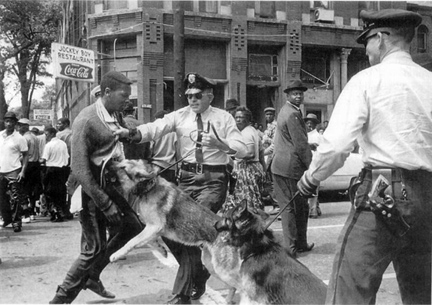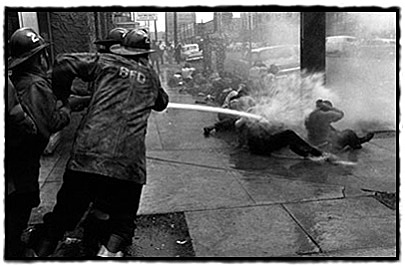My KPFA - A Historical Footnote

Freedom Now! (and Then)
In 1963, while I was safely ensconced in a KPFA control room producing fantasy horror stories with Erik Bauersfeld, Pacifica journalist Dale Minor was down in Birmingham Alabama documenting the real thing. The result was Freedom Now!, an all-time classic of radio journalism. Jointly produced by Dale Minor and Chris Koch, it takes the listener on a two-hour audio journey through one of the decisive moments in the civil rights movement, weaving together actuality recordings of rallies and riots, together with eyewitness accounts by participants and speeches by Martin Luther King and Ralph Abernathy, seminal figures whose voices would soon be heard round the world. The resulting program was America’s entry that year for the Prix Italia.
Dale’s opening narration sets the scene, asking questions which almost half a century later remain only partially answered:
 Forty days of organization and demonstration by the combined forces of the Integration Movement, under the leadership of Dr. Martin Luther King, culminated in the most significant turning point in the entire history of the struggle for racial justice in the United States. The direction of that turning remains in question. After a period of demonstrations that saw small children face the force of fire hoses, that saw a total of 3200 Negroes jailed (nearly two-thirds of them children of grammar school and high school ages), the forces of integration reached an agreement with leading citizens of Birmingham, Alabama, frequently termed “the most segregated city in America.” An agreement which, if followed and maintained, could prove the major breakthrough to racial harmony in this decade. And which, if violated or ignored, could break the dam of non-violence, and expose large portions of this nation to a flood of violence and bloodshed.
Forty days of organization and demonstration by the combined forces of the Integration Movement, under the leadership of Dr. Martin Luther King, culminated in the most significant turning point in the entire history of the struggle for racial justice in the United States. The direction of that turning remains in question. After a period of demonstrations that saw small children face the force of fire hoses, that saw a total of 3200 Negroes jailed (nearly two-thirds of them children of grammar school and high school ages), the forces of integration reached an agreement with leading citizens of Birmingham, Alabama, frequently termed “the most segregated city in America.” An agreement which, if followed and maintained, could prove the major breakthrough to racial harmony in this decade. And which, if violated or ignored, could break the dam of non-violence, and expose large portions of this nation to a flood of violence and bloodshed.
§
Fast forward to 2009. This year our intrepid reporters, still surviving, have witnessed events which back then would have seemed like febrile fantasies. Dale comments:
There have been a number of “Oh, Wow!” moments in the past year for those of us who remember the ‘60s first hand. One of those for Chris and me was the election of Philadelphia, Mississippi's first black mayor - both of us remembering well the gangrenous atmosphere of that town in ''64, during the search for Goodman, Chaney and Schwerner.
In January, one of the dignitaries gathered at the inauguration of the nation’s first Black President had been present, in ’63, when Birmingham’s Gaston Motel was bombed – an incident recounted in Freedom Now! John Lewis, then, was a young civil rights worker in Martin Luther King’s entourage. He was not seriously injured in that bombing but he was savagely beaten in ’65, at the Edmund Pettus Bridge, in Selma, an event that probably pushed the Voting Rights Act over the top. I remember later sitting in a hotel room in Selma, watching television coverage of the signing of that bill and hearing LBJ intone the words: "We shall overcome," So, on Inauguration Day, I watched tears roll down Lewis' cheeks and got a tear in my own eye.
On the heels of such righteous sentiment, Dale injects a note of caution:
That was pretty heady stuff! Intoxicating, actually. And people who had drunk too much of that juice started talking about “post-racial” America. We woke up with a terrifying hangover that included “Kill Obama” signs scattered here and there and automatic weapons openly carried at presidential appearances. The last 50 years have been one hell of a ride, but where are we now? I wish I knew.
Okay, truth in packaging: I live in Arizona, a place where liberals frequently have Yeatsian nightmares about rough beasts slouching towards Bethlehem and where senseless anger and paranoia are rampant. I feel honored to have witnessed some of the struggles and accomplishments of the greatest social and political movement in American history. I hope we can build on that success. But I am not an optimist.
§
Chris Koch would go on to produce This Little Light, a series of twelve programs about this whole revolutionary period in Afro-American history. As it was all happening, he talked at length with KPFA’s legendary Public Affairs Director Elsa Knight Thompson. You can listen to their conversation here.
Summing up Pacifica’s reportorial strengths over the years, Chris comments today:
"I think our coverage of the South (and elsewhere) is an incredible lesson in journalism. Our mainstream colleagues tended to cover the "movement" from their traditional sources: the local papers, mayor's office, sheriff's department, local business owners, etc, most of whom were resisting change. Our contacts were the blacks folks affected by the movement, the young people taking part in it and their leaders. The movement won out over the resistance, so we were on the side of history and got the story right.
But at the time it was two steps forward and one back:
At the Democratic Convention in 1964, the Mississippi Freedom Party lost. Since the last program in the series was devoted to the Mississippi Democratic Party's failed attempt to be seated at the 1964 Democratic Convention in place of the "official" state delegation, it was ultimately reportage on a sidebar to history.
But as history chases its tail, yesterday’s sidebars have a way of becoming tomorrow’s headlines. In 2009 we have gone from the euphoric inauguration of our first Black President (during which—uniquely—there were no recorded arrests of rowdy celebrants) to paroxysms of organized hatred involving an accellerating number of assassination threats, some of them openly displayed on placards. Freedom Now! will take you back to a moment when battle-scarred veterans of the endless struggle for civil rights could pause briefly to share a cautious optimism.
Freedom Now!
Part One: Recording Transcript
Part Two: Recording Transcript
The following credits are from the remarkable website, Veterans of the Civil Rights Movement
Freedom Now! was produced from tape recordings made in Birmingham, Alabama, and New York City by Dale Minor. The field recordings were made between May 11 and May 14, 1963, during the height of Negro demonstrations.
Freedom Now! documents and dramatizes the struggle for racial equality in Birmingham. The program deals with demonstrations that led to an agreement between white and Negro citizens of Birmingham, the various interpretations of that agreement, the bombing of Negro homes, the Negro reaction to those bombings, and the Negro leaders' attempt to control the struggle for racial equality.
The events in Birmingham represent a crucial phase of the Negro's struggle in the United States. Birmingham may go down in history as the first turning point for United States Negroes. This larger significance is dramatized in Freedom Now!
Included in the program are the voices of: The Revs. Fred Shuttlesworth, James Bevel, Ralph Abernathy, A. D. King, Martin Luther King, Jr., and Bernard Lee; Birmingham's Mayor, Arthur Hanes; Police Commissioner Eugene "Bull" Connor; Birmingham financier Sidney W. Smyer; attorney Charles Morgan; a Black Muslim leader, Jeremiah X; CORE field secretary in Birmingham, Isaac Reynolds; and the voices of many Birmingham Negro and white citizens. Attorney Charles Morgan was recorded in the WBAI studios; all other recordings were made in the field.
The program was produced and edited for Pacifica Radio by Dale Minor and Chris Koch. Technical production was by Bob Kramer.